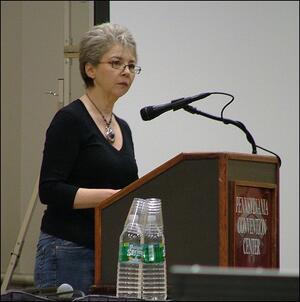Mary Doria Russell
Mary Doria Russell at an event in 2008. Photo courtesy of Jeffrey Beall via Wikimedia Commons.
An experimental writer who often grapples with religion in her writing, Mary Doria Russell has found inspiration in historical events from World War II to the OK Corral. Russell began as a biological and cultural anthropologist, focusing her 1983 PhD dissertation at the University of Michigan, Ann Arbor, on forensic analysis of Neanderthal biological features and burial practices. After many years of spiritual seeking, she converted to Judaism in 1993. In 1996 she published her first novel, The Sparrow, which drew on her Italian-Catholic heritage and anthropological training to imagine a Jesuit mission to an alien world. The book earned her numerous awards, including the James Tiptree, Jr. Award, the Arthur C. Clarke Award, and the British Science Fiction Association Award. She then turned to historical fiction: 2005’s A Thread of Grace, set in Italy during World War II, 2008’s Dreamers of the Day, which focused on the interwar negotiations that created the modern Middle East, and Doc (2011) and Epitaph (2015), which recovered and embellished the work of previous Jewish writer Josephine Earp to breathe new life into the story of Wyatt Earp and Doc Holliday. For Women of the Copper Country (2019), she researched the Country Copper Strike of 1913-1914, the first unionized strike against the Copper Country of Michigan’s Upper Peninsula.



